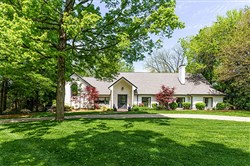VOL. 46 | NO. 44 | Friday, November 4, 2022
What happens when buyers can’t, won’t close the deal?

4304 Lillywood Rd
Veteran real estate broker Allen Huggins recently closed a transaction involving the home at 4304 Lilywood Road, one of Belle Meade’s secret streets hidden from view off Lynnwood Boulevard. Huggins is the principal broker and owner of WH Properties, a wildly successful firm that he opened before things were wildly successful.
“Back on the market due to buyer’s inability to close” in his most recent description of the property. Buyers failing to close on properties has become commonplace in the frantic market, and sellers are curious and usually mistaken as to what happens in these cases.
The seller’s first reaction is to ask for the buyers’ earnest money to be forfeited to them, and that could be what ultimately happens. However, that is rarely how these situations are resolved.
How things play out in this scenario depends on why and when the buyers make their positions known. Many walk following inspections, and sellers are often suspect as to whether the inspection killed the deal or if the buyer’s feet suddenly took a chill. If that’s the case, holding said feet to the fire does not tend to warm the buyers’ feelings toward the properties.
If the buyers choose to terminate in a timely manner and within the conditions of the contract, the earnest money is refunded. However, the contract used by most of the residential real estate brokers in Tennessee has a gaping hole pertaining to financing.
If there is a contingency for buyer’s ability to secure financing, the boilerplate language on the contract most Tennessee Realtors use requires the buyer to apply for the loan and pay for the credit report within three days. Additionally, they must let the seller know the name of the lending institution and the human being assisting in the transaction.
Buyers usually adhere to those obligations, which often amounts to an expenditure of around $39.50. That’s quite the commitment. Most buyers stay in the game long enough to fulfill that obligation.
In the same paragraph of the contract, the buyers are given the opportunity to change lenders. Next, the buyers must warrant to the sellers that they have the cash to close and that they have informed the lender to move forward to closing.
Also, they warrant that they have homeowners’ insurance. This is often done, but not always.
Even if the buyers announce they intend to close, the underwriters have not been asked to weigh in on the matter. Underwriters can prove difficult, or at least they seem that way to the buyers. There are numerous cases when, much to the chagrin and astonishment of the buyer and their agent, the loan is rejected.
Since the dawning of the age of higher interest rates, appraisal contingencies have begun to let the sun shine in as to the value of properties. Appraisals include certain boxes to be checked as to whether a neighborhood is trending upward or downward.
Recently, an appraiser decided that a property in Green Hills was located in an area trending downward. That shocked all involved. Nonetheless, the property did not appraise for the sale price, and the buyer was forced to invest more of his own funds. But he could have terminated the contract.
There are numerous contingencies and conditions that must be met. One of those conditions is not the removal of the financing contingency before closing. If the buyers make a loan application, pay for the credit report and notify all that they are moving forward, the deal still might not close.
Many complete all requirements and have the money awaiting them at the title company, then decide not to close. That is an example of a case when the sellers could keep the earnest money.
At that point, most sellers want to sue. The sellers would have had to have been damaged, and then they could sue for whatever those damages are. If they put the house back on the market and it sells for the original sales price or above, the sellers would need a really good lawyer to recover anything.
The house at 4304 Lilywood Road did sell this time around, and all was right with the world. The buyers were represented by the revered Jody Hull, a member of the legendary Bainbridge family.
The new owners purchased the home for $3.6 million – $579 per square foot – after Huggins listed the house for $3.8 million, a price in his wheelhouse. Huggins had recently sold several other high-end houses in Belle Meade and Hillwood.
Huggins said the sellers had done extensive renovation on the house during the past five years after buying the house for $1,926,000 in 2017. The chef’s kitchen includes a La Cornue range and Sub-Zero refrigerator, an appliance that has barely escaped extinction and can now be ordered for a late 2023 delivery. Wolf appliances are installed along with Italian marble countertops.
With the primary bedroom down, there are four other bedrooms and a total of five bathrooms and a half-bath.
Outside, there is an inground pool and a spa with a Jacuzzi. There is plenty of room for dining and lounging, Huggins noted.
Richard Courtney is a licensed real estate broker with Fridrich and Clark Realty and can be reached at [email protected].